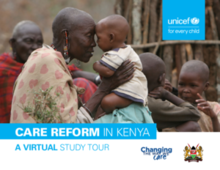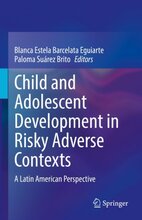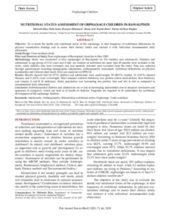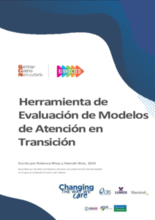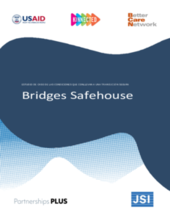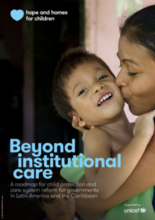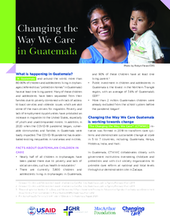Displaying 91 - 100 of 691
This Changing the Way We Care virtual study tour aims to provide an overview of care reform in Kenya from the comfort of your own home. Care reform relates to the care of children. It refers to efforts to improve the legal and policy frameworks, structures, services, supports and resources that determine and deliver alternative care, prevent family separation and support families to care for children well.
In this best practice article, the challenges faced by these children with disabilities and the potential for inclusion within the CCI are discussed based on the field action project intervention of the Tata Institute of Social Sciences (TISS), Mumbai, with selected government CCIs. The article suggests a multi-pronged intervention approach for the Children with disability (CWD) at the levels of the individual CWD, peer group, CCI and the juvenile justice (JJ) System, which are together recognised as the stakeholders of an ‘inclusive ecosystem’. The article arrives at the ‘Inclusive Ecosystem Model of Rehabilitation’ by drawing from the individual–environment interaction model of disability.
The causes of institutionalization are multiple and the impact it causes is reflected in different areas such as the development of the child in general, such as mental, psychic structuring, health, and nutrition. Psychologically, children present alterations in their cognitive, emotional, sexual, and social domains with a high probability of developing several pathological conditions. This chapter presents an overview of this phenomenon based on several research investigations carried out in Spain, Latin America, and Mexico.
The objective of the study was to evaluate the health and nutritional status of four registered orphanages of Rawalpindi, to find frequency of nutritional deficiencies by physical examination findings and to assess their dietary intake and contrast it with individual recommended daily allowances.
This video case study was developed as a part of the Transitioning Models of Care Assessment Tool training package. It is 1 of 8 video case studies exploring different aspects of learning on transitioning residential care services. To access the full set of case studies or the training package, visit the BCN Transition Hub.
These video case studies were developed as a part of the Transitioning Models of Care Assessment Tool training pa
Esta herramienta tiene como objetivo ayudar a los profesionales a lograr los siguientes objetivos al brindar apoyo técnico a las instituciones en transición:
Este estudio de caso destaca algunos de los requisitos previos para el punto de partida de una transición exitosa de la atención residencial a un modelo no residencial, muchos de los cuales a menudo se pasan por alto o se subestiman. El estudio de caso se organiza en torno a las distintas etapas de la transición y explora algunos de los temas clave descritos en la Herramienta de evaluación de modelos de atención en transición.
This report provides a framework for governments to develop their own roadmap for child protection and care system reform and deinstitutionalisation. The authors hope that it will inspire a conversation, guide inter-ministerial and cross society dialogue, support multidisciplinary groups at all levels to frame their own assessment, and plan their own roadmap for change.
This two-pager highlights 2018-2020 results of the The Changing the Way We Care℠ (CTWWC) initiative for decision makers, government officials, media, other institutions or organizations working with children and adolescents, and private and public counterparts. CTWWC was formed in 2018 to transform care systems and demonstrate sustainable change at scale in 5 to 7 countries, including Guatemala, Kenya, Moldova, India, and Haiti. In Guatemala and around the world, more than 80-90% of children and adolescents living in orphanages (referred to as “protection homes” in Guatemala) have at least one living parent.

